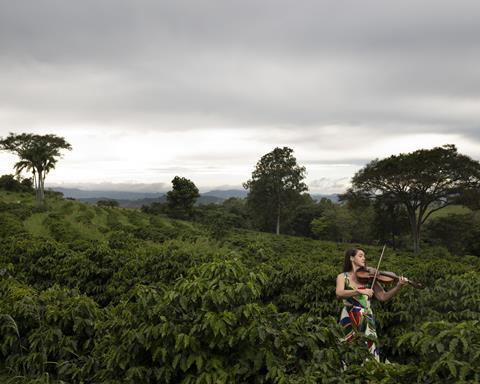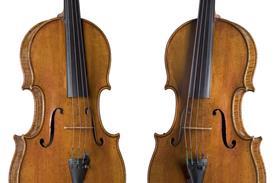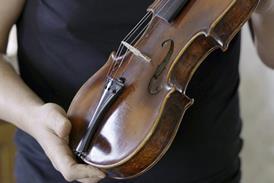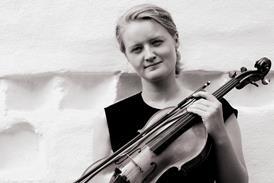Online editor Davina Shum previously described a performance by Ilumina unlike any concert she’d attended before – why? She speaks to the initiative’s founder, violist Jennifer Stumm, about the Ilumina’s ethos and motivation ahead of its tenth anniversary in January 2025

Discover more Featured Stories like this in The Strad Playing Hub
It’s a grey morning in Edinburgh during the International Festival in August 2024, when I sleepily make my way to meet violist Jennifer Stumm, founder of the Ilumina initiative, having seen her and the ensemble in concert the previous evening at Usher Hall.
I apologise to Stumm for my lethargic demeanour. ‘Oh, not at all,’ she says. ‘The day doesn’t start until I’ve had coffee.’ I understand straightaway that she too requires an adequate intake of caffeine before any work can get done.
It’s fitting that we’re meeting at a small independent café on the outer perimeter of central Edinburgh, sipping on flat whites and cappuccinos. Stumm and I have met to discuss Ilumina, which made its beginnings on a coffee farm in Brazil in 2015. Based in São Paulo, Ilumina is an artist collective that nurtures rising young musicians from Latin America, uniting them with leading international artists. The initiative cultivates a community of artists that are encouraged to use their diverse voices to make music together, creating an eco-system of knowledge and cross-industry innovation.
The annual Ilumina Festival is held every January in São Paulo, with a majority of its large audience coming from urban and agricultural peripheries that are hearing classical music for the first time. January 2025 will mark the festival’s tenth edition, and Ilumina plans to launch a new concert series in São Paulo from November 2025.
Each year, hundreds of musicians between the ages of 18 and 26 from the global south audition to be part of the Ilumina Festival. Many of these musicians have showcased talent already and have plans to study abroad at a top conservatoire, but don’t know how to go about it. Stumm, a viola professor at the Music and Arts University of the City of Vienna who worked in São Paulo for many years and has a residence in the city, is a valuable role model for these musicians.
‘The mission is to ensure equal talent gives equal opportunity,’ says Stumm. She describes the situation of many accomplished musicians who come from backgrounds which are not set up to support stars, resulting in disappearing talent.
‘Almost everybody after the festival goes on to study somewhere great,’ she says, adding that conservatoires in Austria are now populated with numerous string players from Latin America, many of whom study with her. Others spread their wings and fly their own ways to find new opportunities. ‘That’s their big dream.’
But it’s not just about these young musicians learning from great professors to help them improve their technique and access certain information. Stumm advocates looking at the situation from a point of equality and celebrating their multifaceted skills: ‘They have amazing ear skills, singing skills, improvisatory skills, things that most northern hemisphere classical musicians simply cannot do. They have these other superpowers, and that’s what allows us to do the things we do on stage now.’
I’d witnessed Stumm and Ilumina in action the previous evening in performance. Perched on a bean bag, I watched as the ensemble members, dressed in bright colours, performed a diverse programme that flitted between traditional Brazilian music and western Classical canon – and possibly most notably, performed largely by memory.
‘What’s probably true is that for musicians of the collective, they’re unbelievably good at memorising. They have strong singing backgrounds and ear training backgrounds. They’re much better than me!’ Stumm laughs. She believes it helps the musicians play better by becoming more aware of everything else happening in a piece, ‘not just your part.’ Memorisation also allows for a sense of freedom while playing, evident in how the ensemble members move theatrically while performing.
‘It’s interesting when you try to get classical musicians to dance, for instance, they just don’t want to do it,’ Stumm observes. ‘In general, classical musicians are terrible dancers, but why? We’re so musical, it makes no sense. There’s something in it, that perfectionistic culture where people don’t want to look silly. And so at the festival, it’s part of the deal. It doesn’t matter how famous you are, you will go to Samba masterclass, and you will dance.’

Stumm reiterates that everyone’s dedication to memorisation and knowledge of the score allows the rehearsals to be run in a communal way, like chamber music on a grand scale. ‘Kill the conductor’ is a mantra that she half-jokingly tosses into conversation. She encourages listening and observation within the group to promote autonomy, rather than the traditional sense of hierarchy often found with orchestral members following orders of a conductor.
With the invitation of such freedom among ensemble members, how do rehearsals run without falling into chaos?
‘There is an artistic director, and that is me, so in that way, that element of hierarchy exists,’ she admits. ‘I don’t think it would work without that at all. But everyone is free to speak and I encourage that.
‘We’re always exploring – without making rules - how to develop a culture of respect and how many opinions at a time can we manage, yet still work and how do we use our time well.’
‘The idea is that we have people that have multifaceted skills and musical skills in the group and they’re bringing different things.’ She highlights cellist Bruno Lima, a highly skilled improviser, composer and arranger who featured prominently in the previous night’s performance.
‘We have a number of people who are very strong leaders in the collective and are older. We also have some people who are happy playing in the section; they don’t particularly love leading. And I think that’s fine. So it’s about trying to identify what serves each person. But I don’t think there’s a single person who doesn’t speak up and doesn’t share their opinions on what’s going on.’ She believes that this interdependence within the group is a sign of a healthy cultural eco-system.
Being an active member of an ensemble cultivates skills in its members that are taken beyond Ilumina. Stumm mentions former Ilumina participants that have gone on to start their own festivals, exercising entrepreneurship to bring musical opportunities to those that need it most. Stumm believes that musical initiatives often suffer from being invested in widely, but not deeply.
‘What happens if you invest deeply in a smaller number of people? This is exactly the way that privileged people receive investment. Nobody bats an eye paying for business school for their kid, even though that’s $100,000 a year. Often foundations will say oh no, that’s too much money for one person. We’re going to invest ten dollars in a large number of people.’
‘What we see is that it is worth it to invest deeply,’ she says, citing the importance of representation within a community. ‘What’s the individual reach of someone coming from the community, where no one has gone to a great university? That narrative is so powerful in the community and reaches 10,000 people from one. To me, that’s unbelievably efficient. It’s also 10,000 people you’re not paying for.
‘The fact is, deep investment in people goes so far.’
I can’t help but think of investment in terms of sowing seeds – coffee specifically – the quality of the seeds sowed, in combination of the right, nurturing environment with the opportunity to grow, eventually leading to self-perpetuation and a sustainable eco-system.
‘Coffee is everything in life!’ Stumm exclaims. As she outlines the group’s plans ahead of its upcoming anniversary, we order another round of coffee.
Named FUTUR_, Ilumina’s tenth festival will feature chamber music and attractions throughout the year in Mococa, Caconde and São Paulo. More than 40 artists from 13 countries will rehearse, socialise and create together on an organic coffee farm, uniting tradition and innovation in an inspiring setting.
Throughout the festival, the public will be able to enjoy six free concerts, presented in different cities. This edition aims to highlight diversity and the premiere of a new work by the renowned Brazilian composer Clarice Assad.
Additionally, the festival will present participation of professionals from areas such as multimedia, leadership, finance, body movements, technology and much more, with interdisciplinary approaches the focus to transform the event into a space for learning and exchanging experiences, enriching artists and audiences.
It seems that the Ilumina musical eco-system is alive and thriving, with no sense of slowing down, driven by passion. And caffeine.
The tenth Ilumina Festival FUTUR_ takes place from 5 to 12 January with presentations and multimedia shows at Sala São Paulo and Casa das Caldeiras, plus activities in cities in the state of São Paulo. Find out more here.
Read: Sentimental work: Jennifer Stumm on Rebecca Clarke’s Viola Sonata
Read: Scandinavian Cello School: The road to Vienna
Discover more Featured Stories like this in The Strad Playing Hub
The number one source for playing and teaching books, guides, CDs, calendars and back issues of the magazine.
In The Best of Technique you’ll discover the top playing tips of the world’s leading string players and teachers. It’s packed full of exercises for students, plus examples from the standard repertoire to show you how to integrate the technique into your playing.
The Strad’s Masterclass series brings together the finest string players with some of the greatest string works ever written. Always one of our most popular sections, Masterclass has been an invaluable aid to aspiring soloists, chamber musicians and string teachers since the 1990s.
The Canada Council of the Arts’ Musical Instrument Bank is 40 years old in 2025. This year’s calendar celebrates some its treasures, including four instruments by Antonio Stradivari and priceless works by Montagnana, Gagliano, Pressenda and David Tecchler.





































No comments yet